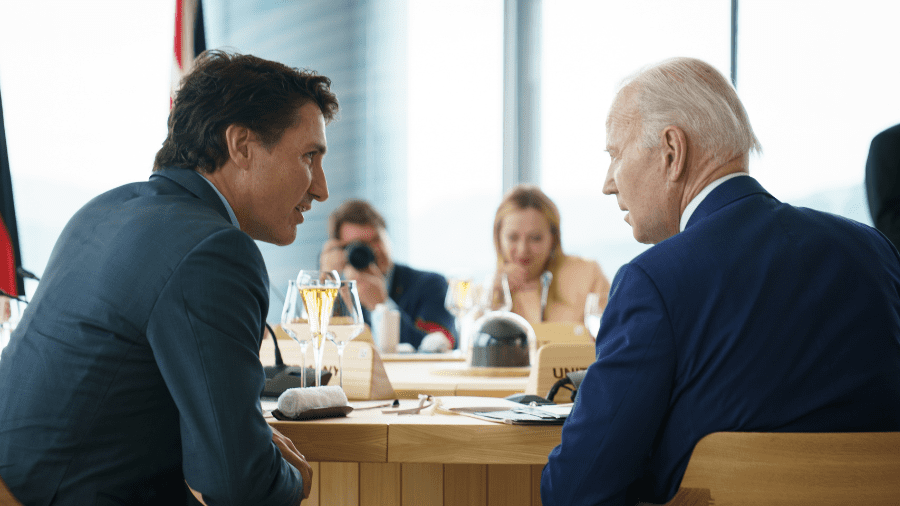This article originally appeared in iPolitics.
By Ann Fitz-Gerald and Jonathan Berkshire Miller, January 23, 2024
Despite its apparent cozy place in North America, Canada’s global future has never looked so fragile, ill-defined and worrying.
The evidence paints a clear picture: Canada is forecasted to have the worst performing advanced economy from 2020 to 2030. It suffers from a broken immigration system at a time when supporting an aging population is vital. These demographic realities are worsened as Canada continues to lose innovators and economic leaders, primarily to the United States; and its deficit on intellectual property payments and receipts is comparable to those of developing economies, weakening our global supply chain.
Magnifying these economic headwinds are troubling signs on national security. Ottawa admits it has an incapacitated military and struggles with an antiquated national security apparatus unprepared to meet the needs of today’s complex environment, let alone the surprises of tomorrow.
There is no time to navel-gaze about long-term security trends and the future of multilateralism. Canada is in a national security crisis.
What can be done? The first step is to engage with Canadians to establish the country’s national interests and how they connect with the world.
Global security is undergoing profound shifts, with wars in Europe and the Middle East, and China’s determination to flout international laws and norms for its own interests.
Canada’s response to these shifts has been weak-kneed and reactionary. In contrast, our allies have acted with unprecedented urgency. Similar to other NATO allies, Germany has begun the most dramatic shift of its security posture since the Second World War. Meanwhile, Japan, which has underspent on defence for years, has significantly increased its security posture, buttressed by clear strategies.
Meanwhile, Ottawa continues to be indecisive over the utility of clearly defining its interests. The country is an outlier globally, with no recent efforts to frame its interests through a national security strategy, defence strategy or clearly expressed foreign policy.
The articulation of national interests is crucial as it signals to Canadians and the world what we care about, and what we are committed to defend.
In a period of global turbulence, particularly for countries that host large diaspora populations, being clear on national interests can provide stability and resilience. These “words” can help redefine the country, bring more meaningful contributions to international tables, and give political leaders the wherewithal to differentiate Canada from the words used by others.
Lastly, a clear narrative could strengthen Canada’s communities and social capital, which, for a country with diminishing capacity to assimilate individuals and groups, is so desperately important.
Strategies consume precious bureaucratic bandwidth, but they also provide the lens and signal switch with which Canadians engage with the world. To claim that the world is shifting too fast is a red herring. The speed of global shifts is precisely why countries need purpose rather than muddling through. The alternative is a game of geopolitical whack-a-mole.
The failure to strategize could make previously unimaginable scenarios disturbing realities, including foreign adventurism of our Arctic waters, as global warming gradually makes the Arctic more inhabitable; increased irrelevance in the G7; higher levels of middle-class poverty; and levels of gang violence seen in countries like France and Sweden.
Canada must also acknowledge its existence in an environment of intangibles, where a national posture must focus on the power of data and intellectual property, and where future potential will depend on the strength of Canada’s higher education system and its skilled civil service.
How effectively Canada is able protect its defined interests not only depends on its ability to pivot into the new global landscape but also to add value to it. Showing up and lecturing the world on the “Canadian model,” which itself is undefined, will not do us any favours.
If Canadians can hope to bring back a quality of life and future promise that many of us were so fortunate to grow up with, the government must create the foundation for a visionary outlook now.
Ann Fitz-Gerald is the director of the Balsillie School of International Affairs. Jonathan Berkshire-Miller is the director of foreign affairs, national defence and national security at the Macdonald-Laurier Institute.






